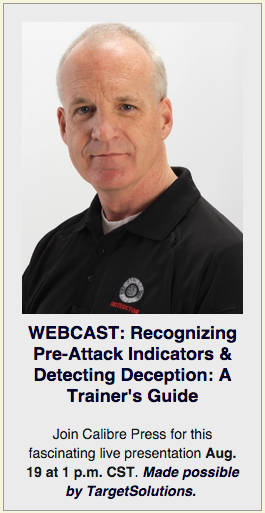It’s not sexy, and I’ve both talked about it in courses and written about it thousands of times, but it still bears constant repeating: Communication skills and a base understanding of the human animal are the most important things to learn and master for those in law enforcement.
And you can’t have one without the other.
I keep reading and hearing about how cops need more training in conflict resolution and de-escalation tactics. And that’s absolutely true! Without question police officers have to be able to do both of those things. My problem is that most of the programs I have come across at least are pointless, boring, ineffective and consequently useless.
I’m not saying all of them, but as of today I’ve experienced very few useful and realistic programs that actually meet their stated goals.
Why?
Well there are several reasons. I’ll name a few here.
Too theoretical: If you were never a cop you can’t teach this stuff to cops. Sorry, it’s true. Don’t care that you have a Ph.D—or even two. If you haven’t dealt with a smelly, drunk miscreant at 2 a.m., theory means little. In fact, it often clashes with our reality.
Tactics and Techniques: These are iffy at best and useless almost all the time. In other words, if you’re teaching a list of things not to say, words you can use and words you can’t use, and then pass out little laminated cards to carry in our pockets in case we forget, you don’t know what you’re talking about. Because as I’m pulling out the card, that’s when I’m gonna get whacked with a table leg, beer bottle or a fist. We need to think on our feet, and that requires focused awareness.
Ignoring human psychology: Most of these programs don’t teach a base understanding of the human animal. And I mean a basic understanding of what is going on in the mind of the majority (not all) of people during interactions and especially when they are in crisis mode.
One-size-fits-all programs: This is where it gets stupid. And yet this is what the public, media and unfortunately many administrators are looking for. Ignoring individual officer’s personalities and skills is ridiculous, which consequently makes the program worthless.
In the course of my career I went to some of the best interview and interrogations programs in the country. Most are great. But no matter how good they are if anyone thinks they can walk out of one of those courses and get a confession by using a 10-, 12-, 15-step process, they’re nuts. Your personality and particular skill sets need to be used. Successful hostage negotiators know this well.
So you people screaming for more training in how to diffuse the fused and deescalating the escalated here’s my advice: The type of training matters.
So we plan on writing a series of columns following this one about human communication and effective interaction skills. We will address pre-attack indicators, detecting deception, spotting preflight behavior, etc. But before we do we need to begin at the beginning: What are cops supposed to be doing?
No, I’m not talking about task accomplishments like writing tickets, patrolling, citing business violators, and so forth. I’m talking about the basics when it comes to dealing with human beings.
So here it is: Police officers are in the business of controlling, influencing, redirecting and manipulating other people’s IMMEDIATE BEHAVIOR.
That needs to be the foundation of our understanding.
After that, all training that deals with communication—conflict resolution, de-escalation, building rapport, negotiating with hostages and getting confessions—needs to stay focused on the fact that we are dealing with the human animal. And during these interactions, that human animal is stressed, and often apparently out of control.
Finally, the credentials of the instructor matter. But I’d rather have a good street cop with a proven track record of handling real people in real life situations that a professor who did studies on interaction behaviors of lab rats and rhesus monkeys.
Conclusion
Police officers live and die, literally, by their ability to read people and communicate effectively. Some are good at it naturally. But no matter how instinctive you may be, understanding human beings and why things work and don’t will make you even better. This includes—and in fact, must begin with—developing a base understanding of yourself.










0 Comments